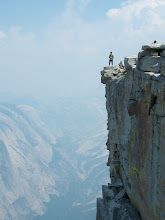I'm taking a Wilderness Medicine class 2 nights a week to become certified as a Wilderness First Responder. So far I've been lucky enough to've gotten by without anything serious happening to me or my kids or my brothers during any of our outings. I was never a Boy Scout, instead of preparedness I've always relied on resourcefulness and luck, and its made life fun. But I've decided I'd like to pursue more jobs as a guide, and in October I plan on applying to the local volunteer Search and Rescue team, its time I learn how to take care of things proper
Couple things that Wildernes Medicine makes me think about...
There are different ways that people experience the Wilderness. Some people have that Thoreau-like relationship where they feel mostly just an awe and splendor at witnessing and participating with Nature. That purely positive and tremendously healing side of the wilderness. Here, Nature is all-encompassing, a grandness, and it is impersonal.
Then there are others, sometimes they are newcomers, who revere and are in awe of Nature, but who stand separate from it. Here Nature is a Giant, separate contender, and not always a good sport. People go outside and they do more than ask to just look at Nature, they try to climb all over it, try to live for a while in places where Death is the landlord. And sometimes Nature, or a Mountain, says "Get off of me. Youre not supposed to be here. Now I'm gong to kill you." and now its man fighting against nature, we've gone out looking for a good fight. To win, to survive, we use all the tools and clothes we've invented and all the strategies and methods we've developed, and we see if we can't manage to hold our own against the whole of Nature who wants us dead. It is always an interesting fight.
It makes me think of Asklepios, the son of Apollo who from birth was a constant affront to Death. Snatched last minute out of his dead mother's belly while roasting in the middle of a raging funeral pyre, he managed to survive an entire childhood alone in the wilderness. Then he studied medicine and was a great healer until he gained enough knowledge to pull off his greatest insult towards Death, bringing the dead back to life. Death sees itself as the unquestionable big winner in the game of life, and here's Asklepios, reversing the decision after the final bell has rung, stealing the victory prize and calling some arbritray do-over. And with what authority? Was it hubris or was it righteous, the idea that man has some sort of "right" to pull himself or any other out of certain death? The question wasn't left hanging very long, Zeus demanded that mortals must follow their own destiny and decidedly fried Asklepios with a thunderbolt.
So here we are, daring through places Nature tells us we can't go, using everthing we have to stop the Mountains from shaking us off their shoulders, to stop the wind and the ice from freezing us, to stop the sun from boiling us. And heaven has made itself clear: It is not on our side. Is it righteousness or is it hubris for man to take up this fight for his survival when he is first of all an intruder? If it is hubris then, is it hubris to ever fight against death? I cannot answer that question yet, until I have spent some time closer to real death and high stakes and remote unforgiving wilderness. But for now I'll be learning everything I can to help make sure me and everyone I know keep making it back home in one piece.
skip to main |
skip to sidebar

What is Summit for Someone?
Support My Climb!
Blog Archive
-
▼
2009
(21)
-
▼
February
(7)
- Peak Bagging Ladybugs at Cuyamaca Peak (6,512 ft)
- Crocodile Hunting at Mildred Falls
- Full Moon Hike- Iron Mountain (2,700 ft.)
- The Moon gives eyes and the Sea steals shoes - Tor...
- Wilderness Gardens Preserve - Volunteering with In...
- The Children & Nature Network (Lecture Tuesday 2/24)
- Soon to be Medical MacGiver in the Backcountry
-
▼
February
(7)
Allow myself to introduce...myself

- Luis Omar Lopez
- San Diego, CA, United States
- I'm a horse guide, bookseller and volunteer, training and picking up better mountaineering skills. I'm fundraising for my Summit for Someone climb up Mt. Rainier in July, the money I raise will empower at-risk youth by providing them with life-changing, week-long wilderness experiences.



